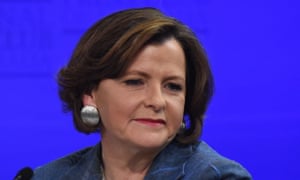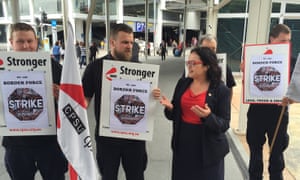Extract from The Guardian
A rise in female bosses such as Ged Kearney and
Caterina Cinnani means the face of the union movement now looks a lot
more like Australia than the front bench
‘Accusations of thuggery are incompatible with
the spotless history of Ged Kearney, the former nurse, who grew up
the second youngest of nine children in a publican family from
Richmond.’ Photograph: Mick Tsikas/AAP
Contact author
Wednesday 6 January 2016 17.14 AEDT
Well, the trade union royal commission (Turc) has
wound up at a cost of at least $40m to the taxpayer, the referral to
police of its own star witness Kathy Jackson, the exoneration of both
Julia Gillard and Bill Shorten from any wrongdoing and the public
questioning
of the impartiality of its commissioner, Dyson Heydon, after it
was revealed he had agreed to headline a Liberal party fundraiser,
mid-commission.
There may be some scratching their heads as to why
the Liberal government invested so much time and money for a handful
of criminal referrals so paltry they were announced in the media
deadzone between Christmas and New Year. This is to underestimate the
propaganda value to the Liberals – every election cycle – of
invoking the spectre of their opposition’s association with “union
thugs”. The image is always male and ever monstrous, with carefully
evinced suggestions of standover tactics and corrupt criminality.
The Turc was desperately crucial for the Liberals
to fix this image in the minds of the electorate, because the window
to do so with any visual resemblance to reality is closing fast. The
problem that the Liberals have is that today’s union leader looks
ever less like the vulgar caricatures of rough and potentially
criminal men on which the conservative fear mongering depends. A rise
in female leadership and the diversity of social backgrounds from
which they come has delivered to the union movement a face that looks
far more like Australia’s than the Coalition’s own cabinet. Here
are some of the powerful union women destroying the Liberals’ “thug
myth” forever.
Ged Kearney
It’s hard to square any contemporary
conservative’s demonisation of union bosses with the living reality
of Australia’s most recognisable “boss”, the Australian Council
of Trade Unions president, Ged Kearney. Accusations of thuggery are
incompatible with the spotless history of the former nurse, who grew
up the second youngest of nine children in a publican family from
Richmond. Before her 2010 election as ACTU president, Kearney was
federal secretary of the 250,000 member-strong Australian Nurses and
Midwives Federation. Her vocal public advocacy and visible activism
has made the union movement a powerful ally of campaigns for social
justice, asylum seekers, climate action and feminist causes.
Sally McManus
When in mid-2015, the Australian wrote with horror
of a “secret army” of union activists being mobilised by the
ACTU, they were incorrect that the project was secret and they
neglected to name its field marshal. The campaigns director of the
ACTU as well as its vice-president, Sally McManus was a brilliant
young philosophy student before ascending the ranks of the Australian
Services Union. At the ASU, she represented community workers, water
workers, rail workers and the airline industry – notably, in many
bitter battles against Qantas management – in a 21-year career that
peaked with her election as NSW secretary. Her talent for campaign
tactics and field organising was proved long before her elevation at
the ACTU; McManus has a long activist history as a social justice
coalitionist and feminist – not least of all during the Equal Pay
Campaign for community workers during the last Labor government.
She’s also one of the founders of Destroy the Joint.
Meredith Hammat
Another former ASU state secretary, Western
Australian Meredith Hammat’s rise to the leadership of Unions WA is
significant for its implicit triumph over a state industrial culture
politely described as male-dominated. Western Australia’s blue
collar industries are centred around mining, maritime and
agriculture, and longstanding demarcation rivalries have often
provoked fractious relationships between unions. Hammat’s
reputation is as a unifier and strategist. Her leadership role within
the tightly-coordinated union campaign in the Canning by-election is
widely understood to have helped deliver the 10% swing suffered by
the Coalition in its formerly blue-ribbon seat.
Roslyn McLennan
The current general secretary of the powerful
Queensland Council of Unions, Ros McLennan took over in August 2015
from 30 year veteran John Battams. McLennan’s background was at the
Independent Education Union, who represent teachers at independent
schools and private colleges. Widely considered one of the most
impressive campaigners in the effort to bring down the Campbell
Newman government in Queensland, her public advocacy for paid
parental leave has kept that issue on the national union agenda,
while her campaigning against the notorious China Australia Free
Trade Agreement (Chafta) earned her renown: her demolition of
National party MP George Christensen in a Chafta debate was so total
the usually outspoken member is reported to have left the stage
before the debate’s conclusion.
Michele O’Neill
As the national secretary of the once-powerful
Textile, Clothing and Footwear Union of Australia, Michele O’Neill
took up the mantle for workers in the textile and clothing supply
chain worldwide as globalised businesses shifted her industry’s
jobs offshore. She has used her experience in Australia to campaign
against exploitation in places like Bangladesh and Cambodia. In 2015,
her determination to protect the representation and industrial rights
of her membership resulted in one of the most surprising union
announcements of the year: the impending amalgamation of the old
TCFUA within the ranks of the militant CFMEU.
Nadine Flood at a Border Force strike at Sydney
Airport, 8 November 2015. Photograph: Toby Mann/AAP
Nadine Flood
The daughter of a Howard government Dfat secretary
who became the high commissioner to the UK, Nadine Flood built her
impressive career in the industrial fight for public sector workers.
Elected national secretary of the Commonwealth and Public Sector
Union in 2010, her fierce protection of the pay, condition and jobs
of public servants has resulted in the most militant and widespread
bargaining strategy undertaken by the CPSU in 30 years. Flood has led
mobilisations of CSIRO scientists to Border Force workers – with 16
separate government agencies engaged in actions and stoppages since
the election of the Liberals in 2013, and the CPSU expanding its
membership by several thousand since actions began.
Lisa Fitzpatrick
The present Victorian secretary of the Australian
Nursing and Midwifery Foundation, this year marks Fitzpatrick’s
15th representing the state’s 70,000 members. She achieved her
reputation as a proactive campaigner not merely for her members but
for the cause of public health – ensuring that Victoria became the
first Australian state and only the second jurisdiction in the world
to legislate minimum ratios of nurses to patients in the health
system.
Jo Schofield
As the National Secretary of United Voice – once
known as the “Misos” or Miscellaneous Workers Union – Schofield
represents an incredible diversity of workers in some of the
poorest-paid and vulnerable jobs within the economy, including
cleaners, ambos, croupiers, correction workers, brewers, hospitality
workers and early childhood educators. Schofield was the founding
executive director of the think-tank Catalyst, whose particular focus
on corporate social responsibility is a theme that’s been amplified
in her campaigns at United Voice – like addressing sham contracting
in the cleaning industry, and the underpayment of wages in
hospitality. Schofield led the very first early childhood education
and care campaign for United Voice, which is an ongoing industrial
battle for a heavily female-dominated industry whose pay even now
remains 30% below professions demanding comparable levels of
qualification.
Susan Hopgood
As the national leader of the Australian Education
Union, former secondary school teacher Susan Hopgood somewhat lives
the Roosevelt principle of power: to talk softly and carry a big
stick. Secretary of the union representing Australia’s teachers and
education workers, the AEU’s national membership of 185,000 makes
them the one of the largest unions in the country. Hopgood has been
secretary since 2006, was the first woman to achieve that position
and also is the current president of Education International, the
international confederation of teachers’ unions. She is the driving
force of the campaign for the Gonski education funding model. ,In the
lead up to the 2016 election, Hopgood has already deployed an
unprecedented national electoral mobilisation of field organisers and
activists. Aspiring MPs of any party: ignore at your peril.
Luba Grigorivitch
The rapid elevation of Luba Grigorivitch to the
position of Victorian state secretary of the Rail, Tram and Bus Union
was not without its controversy. The election of a 28-year-old woman
to represent 8,000 Victorian rail, tram and bus employees in a
traditionally male-dominated industry was perhaps a surprise to
anyone who hadn’t yet, of course, seen Grigorivitch in action.
Already a local councillor by the time she was 24, Grigorivitch is
rumoured to have turned down an offer of Labor preselection for the
safe state seat of Altona in 2013, preferring the industrial battle
to the considerably more bloodless task of state governance. Her
leadership of the RTBU’s industrial action in Victoria in 2015
resulted in the largest public transport demonstrations in living
memory – and, significantly, drew the public admiration of both ALP
right-faction powerbroker Sam Dastyari as well as much-loved
left-wing militant, John Setka from the CFMEU.
Patricia Fernandez
As the numbers of women employed in male-dominated
industries rise, so does their presence in union leadership teams.
Patricia Fernandez came from the shop floor at Ingham and now
represents the butchers and abattoir workers of the Australian Meat
Industry Employees Union to the ACTU. Despite the relatively small
size of her union, Fernandez is a tireless advocate against the
exploitation of temporary visa workers, for penalty rates and a
campaigner for women’s rights and equity outcomes in male-dominated
industries. Derrick Belan
and Danielle O’Brien, outed by Turc for their dynastic
self-indulgence within the rogue NSW branch of the NUW, may, for all
their deserved trouble, be enjoying comparative relief at their
treatment by the law; it is rumoured that having made an enemy of a
shop floor champion like Fernandez, given the opportunity her
punishment of their excesses may have been far less comfortable.
Caterina Cinnani
The president of the National Union of Workers –
who many remember as the former Storeman and Packers Union –
Caterina Cinnani hails from a family of migrant manufacturing workers
in the northern suburbs of Melbourne. Her career in the union
movement began as one of only a handful of female NUW organisers,
representing some of the workers most vulnerable to the deprivations
of the casualised economy. The powerful NUW represents 90,000 workers
across warehousing, cold storage, the food supply chain, poultry,
pharmaceuticals and dairies. Cinnani’s rise from organising has
coincided with a remarkable upsurge in militancy not typically
associated with right-aligned unions like the NUW. The shocking
expose by Four Corners of the conditions forced on workers in the
food supply chain industries is but one of many campaigns pursued by
the activist union under Cinnani’s leadership.
Sharan Burrow
Arguably the most influential trade unionist in
the world, Sharan Burrow began her career as a school teacher before
becoming the president of the Australian Education Union. She shot to
national prominence in her subsequent role as ACTU president, leading
the Your Rights at Work industrial campaign with Greg Combet that
destroyed both the industrial agenda of the Howard government and its
electoral fortunes, too. Burrow is now the president of the
International Trade Union Confederation that represents peak union
bodies across the world, an international leader who’s become one
of the world’s most powerful voices for industrial rights, women
and climate justice. Having won the position with thumping electoral
victories, she represents a global membership of 180 million people
across 163 countries. It means an Australian woman is not just the
union boss of union bosses’ union bosses – she’s the individual
with the possibly the largest democratic mandate in the world.


No comments:
Post a Comment